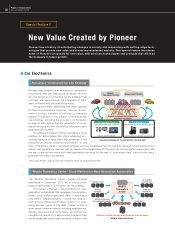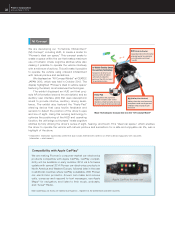Pioneer 2014 Annual Report Download - page 18
Download and view the complete annual report
Please find page 18 of the 2014 Pioneer annual report below. You can navigate through the pages in the report by either clicking on the pages listed below, or by using the keyword search tool below to find specific information within the annual report.
Under the Companies Act of Japan, Pioneer has elected to structure its corporate governance system with
a Board of Corporate Auditors. The Board of Directors decides on fundamental issues such as manage-
ment policies and supervises the execution of business activities, while the Board of Corporate Auditors
audits the directors’ performance of their duties. Based on this institutional structure, Pioneer has adopted
an executive ofcer system to expedite the execution of business activities.
Meanwhile, aiming to enhance the transparency of decision making, Pioneer has established a Group
Executive Committee and voluntary advisory committees to the Board of Directors.
Corporate Governance
Board of Directors, Board of Corporate
Auditors and Executive Officers
Pioneer has adopted a corporate auditor system
of corporate governance. Under this system, the
Company has established the Board of Directors as
a decision-making body for matters of the highest
importance, such as management policies, and as
a supervisory body. The representative directors are
responsible for business execution, while the Board
of Corporate Auditors is responsible for auditing.
Furthermore, executive officers are elected to expedite
business execution and clarify the responsibilities
for each business.
Several highly independent outside directors,
who have no significant transactional relationships
with the Pioneer Group, have been elected to
strengthen the supervisory function of the Board of
Directors as to business execution. In addition, Pioneer
has shortened the term of office of directors to one
year, in order to further clarify their responsibilities and
respond promptly to changes in the business envi-
ronment by increasing opportunities for shareholders
to elect directors. Pioneer’s corporate governance is
further strengthened by the fact that directors focus
on their decision-making and supervisory functions
from a Group-wide perspective, while executive
officers enhance their business execution functions.
The Board of Corporate Auditors, half or more of
which consists of outside corporate auditors with a
high degree of independence, audits the directors’
performance of their duties. In fiscal 2014, the Board
of Directors held nine meetings, while the Board of
Corporate Auditors held 10 meetings.
Group Executive Committee
The Group Executive Committee, which was created
as a process for reinforcing the Board of Directors’
decision-making function, comprises executive
officers chosen by the Board of Directors and holds
regular meetings once per week, in principle. The
Group Executive Committee, under the supervision
of the Board of Directors, thoroughly discusses issues
such as priorities for advancing business activities,
investment projects, Group realignment, and Group-
wide management strategies, as well as medium- and
long-term policies, and approves these issues, or, in
cases where the Board of Directors has decision-
making authority, the Group Executive Committee
reports on these issues to the Board of Directors. In
fiscal 2014, the Group Executive Committee held 34
meetings and deliberated approximately 80 issues.
Voluntary Advisory Committees
To enhance management transparency and
strengthen corporate governance, Pioneer has
voluntarily established a Nominating Committee, a
Compensation Committee, and a Special Commit-
tee, each chaired by an outside director, as advisory
committees to the Board of Directors. The Nominating
Committee discusses matters concerning the election
and dismissal of directors and executive officers, and
the election of corporate auditors. The Compensation
Committee discusses issues related to remuneration
and other benefits for directors and executive offi-
cers. The Special Committee discusses matters that
have a significant impact on corporate value, includ-
ing mergers and acquisitions. These committees
report on the results of their deliberations and make
related recommendations to the Board of Directors,
and the Board of Directors gives full consideration
to these reports and recommendations in the course
of its deliberations.
Ensuring Appropriate Execution of Business
To ensure that directors, officers, and employees
throughout the Group share its corporate philoso-
phy, to “Move the Heart and Touch the Soul,” Pioneer
has adopted a “Group Vision” and formulated the
“Rules of the Pioneer Group.”
Aimed at ensuring that the Company will remain
trusted and respected by society as a good corpo-
rate citizen, the “Pioneer Group Charter for Corporate
Operations” is foremost in importance among the
“Rules of the Pioneer Group.” These rules also
16 Pioneer Corporation
Annual Report 2014
























